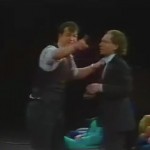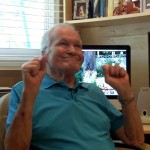 A Loyal Reader Writes:
A Loyal Reader Writes:
“Here is my dilemma. I have been a copywriter/production director at a small-market radio station cluster for eight years. I write and produce copy for the LISTENER, as opposed to the client. I feel it is my job to keep our listeners tuned in during the stopsets. After all, what’s the main reason our listeners have tuned in? TO BE ENTERTAINED.
“Therefore, I try so desperately to give our clients creative commercials that will keep our listeners tuned in.
“Dan, trying to achieve this in a small market is no easy task. Let me re-phrase that….It’s IMPOSSIBLE!
“Do you have any suggestions how to make our clients understand that if we put a commercial on the air that provides some kind of entertainment value or leaves some kind of impact, the listener is more likely to stay tuned in and, hopefully, patronize the client’s business?
“They seem to think the laundry lists and phone numbers and address and same-ole-same-ole cliches will do the trick. Doing things differently around here is like breaking one of the Ten Commandments. I want our radio station to be compared to the Super Bowl — I want us to become known for our commercials! I want our clients’ traffic to increase as a result of that.
“HELP!!!! Whatever you respond, I will forward to our sales staff. Thank you!”
I respectfully disagree vigorously with your point-of-view.
You should be writing and producing commercials designed to produce results for the client, not to entertain your listeners.
Your clients are gambling their money on your station’s ability to help them make money. For some of them, this is very much a life-or- death situation insofar as their businesses are concerned.
When your salespeople convinced them to advertise on your station, they did not promise, “If you give us money, we’ll try to make commercials that entertain our listeners.” Instead, they promised to increase in-store traffic and/or otherwise make the client’s cash register ring.
The station already should have in place commercial guidelines to protect the station’s overall sound and image, and clearly you should adhere to those guidelines. But your sole goal should be to create commercials that make money for the advertisers.
Also, you are laboring under a horrible misconception if you think the only way to maintain the listeners’ interest in a commercial is to “entertain.” All you need to do is make the commercial messages interesting. That could be mean: Funny….Dramatic….Shocking…. Provocative….Emotional….Anything that involves the listener. And, above all, relevant to their lives.
And that could simply be a single voice asking, “Have you been trying unsuccessfully to lose weight?”
Do you have any suggestions how to make our clients understand that if we put a commercial on the air that provides some kind of entertainment value or leaves some kind of impact, the listener is more likely to stay tuned in and, hopefully, patronize the clients’ business?
You’re talking about communicating to the client, “Hey, there’s a real danger here that no one will stay tuned long enough to hear your message!”
A commercial shouldn’t attempt to provide “some kind of entertainment value” or “some kind of impact.” It should be designed to produce specific defined results: to get people to call to request the free information booklet. To get people to come to the dealership and test drive the vehicle being advertised. To come to the restaurant on Wednesday evenings.
We do agree on one thing: Laundry lists street addresses and local retail phone numbers are typical ingredients of bad commercials. And there are ways to teach clients about the follies of their bad advertising.
I can’t believe you’d aspire to being the Super Bowl of radio commercials. The Super Bowl has become infamous for squandering scores of millions of dollars on advertising that sometimes entertains, sometimes wins awards…but almost never helps the advertiser in any way.
What I get from your question mostly is this:
Like most people in your position, you’re a radio person who was given the title of Production Director but who really doesn’t know much about advertising and has not taken it upon himself to acquire a professional-level education in that subject. So you just sort of “wing it,” trying to cope with ridiculous deadlines and trying to make entertaining commercials but not necessarily commercials that provide a positive return on the advertiser’s investment.
And I’ll wager you and your employer have never had a single meeting in which one of you said, “Dammit, we’ve got to find ways to produce better results for our advertisers!”
I offer these thoughts because you asked for my opinion, not to make you feel bad or to insult you.
But allow me to be the first to say this to you:
Radio advertising is not an exercise in creativity. Radio advertising is Mass Salesmanship.
And you should be focusing every ounce of your abilities on selling, not on entertaining.





